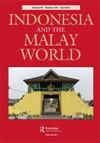Indic-Islamic encounters in Javanese and Malay mystical literatures
IF 0.9
3区 社会学
0 ASIAN STUDIES
引用次数: 3
Abstract
Conceptually, this special issue in Indonesia and the Malay World stems from two collaborative projects undertaken by Andrea Acri and Verena Meyer in the period from 2016 to 2019, focusing on the Suluk Lonthang. The projects investigated the enigmatic suluk with respect to the relation it portrays between sex, transgression – intended as the subversion of gender roles, norm breaking in sexual ethics, and sacrilegious mockery of scriptural religion – and spiritual prowess (as opposed to puritan legalism and scriptural authority) as key elements in the religious experience. Our analysis upheld a comparative perspective that considered the resonances between those ideas in both Sufism and Tantrism, in particular the concept that an advanced spirituality required the overcoming of all oppositions, including those relating to gender and social status (Zoetmulder 1994). Over time, the scope of these projects has broadened further so as to include a larger body of Javanese and Malay mystical literature composed in the period from the 16th to the 19th century, and a wider-ranging variety of ‘encounters’ between Indic and Islamic religious strands embedded in the textual and cultural fabrics of the Javanese and Malayspeaking societies of Nusantara. The idea of putting together this special issue arose from an intellectual need to not only stimulate the investigation of the little-studied bodies of mystical literature like suluk etc., but also to overcome a disciplinary compartmentalisation and parochialisation that has shaped, and is continuing to shape, the field of Javanese and Malay textual and cultural studies after World War II. This situation had resulted in a lack of engagement between researchers working in these fields, who have often been unwilling to go beyond the ‘localised’ micro-histories and philologies that have investigated religious dynamics in the Javanese and Malay-speaking cultural worlds as self-contained phenomena. From a chronological perspective, scholars of the ‘Hindu-Buddhist’ period have rarely, if ever, taken into account ‘Islamic’ material post-dating the 16th century, and vice-versa. Indeed, the major divide in the field would seem to be nowadays represented by scholars studying (Early) Modern Javanese and Malay religious phenomena uniquely from the prism of Islam on the one hand, and those focusing on Hinduism and Buddhism in Java, Sumatra, or the Malay Peninsula up to c.1500 CE on the other. This in spite of the fact that scholars are inevitably dealing with overlapping geographical contexts and temporalities, and phenomena that clearly present as many continuities as changes, or that are amenable to being studied from a comparative and trans-local perspective.爪哇和马来神秘文学中的印度-伊斯兰相遇
从概念上讲,印尼和马来世界的这期特刊源于Andrea Acri和Verena Meyer在2016年至2019年期间开展的两个合作项目,重点关注苏鲁克隆唐。这些项目调查了神秘的苏鲁克在性、越轨(旨在颠覆性别角色、打破性道德规范和亵渎圣经宗教)和精神力量(与清教徒的法律主义和圣经权威相反)之间的关系,这些关系是宗教体验中的关键要素。我们的分析支持了一种比较视角,该视角考虑了苏菲主义和密宗中这些思想之间的共鸣,特别是高级精神需要克服所有对立,包括与性别和社会地位有关的对立的概念(Zoetmulder,1994)。随着时间的推移,这些项目的范围进一步扩大,包括16世纪至19世纪期间创作的大量爪哇和马来神秘文学,以及嵌入努桑塔拉爪哇和讲马来语社会的文本和文化结构中的印度和伊斯兰宗教之间更广泛的“相遇”。将这一特刊放在一起的想法源于一种智力需求,即不仅要激发对苏鲁克等神秘文学研究较少的机构的调查,还要克服学科划分和狭隘性,这种划分和狭隘化已经并正在继续塑造二战后爪哇语和马来语文本和文化研究领域。这种情况导致了在这些领域工作的研究人员之间缺乏参与,他们往往不愿意超越“本地化”的微观历史和文献学,这些微观历史和文字学将爪哇语和马来语文化世界中的宗教动态作为自成一体的现象进行调查。从时间的角度来看,“印度教-佛教”时期的学者很少(如果有的话)考虑到16世纪后的“伊斯兰”材料,反之亦然。事实上,如今该领域的主要分歧似乎体现在学者们,一方面从伊斯兰教的角度独特地研究(早期)现代爪哇人和马来人的宗教现象,另一方面则关注爪哇、苏门答腊或马来半岛直到公元1500年的印度教和佛教。尽管学者们不可避免地要处理重叠的地理背景和时间,以及明显呈现出与变化一样多的连续性的现象,或者可以从比较和跨地方的角度进行研究的现象。
本文章由计算机程序翻译,如有差异,请以英文原文为准。
求助全文
约1分钟内获得全文
求助全文
来源期刊

Indonesia and the Malay World
ASIAN STUDIES-
CiteScore
2.00
自引率
0.00%
发文量
17
期刊介绍:
Indonesia and the Malay World is a peer-reviewed journal that is committed to the publication of scholarship in the arts and humanities on maritime Southeast Asia. It particularly focuses on the study of the languages, literatures, art, archaeology, history, religion, anthropology, performing arts, cinema and tourism of the region. In addition to welcoming individual articles, it also publishes special issues focusing on a particular theme or region. The journal is published three times a year, in March, July, and November.
 求助内容:
求助内容: 应助结果提醒方式:
应助结果提醒方式:


